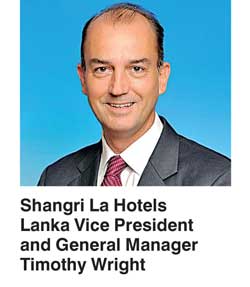Friday Feb 27, 2026
Friday Feb 27, 2026
Saturday, 31 December 2016 00:02 - - {{hitsCtrl.values.hits}}
Sri Lanka can achieve higher numbers of tourist arrivals if it puts in place a robust and strategic marketing plan to promote the island as a world class tourist destination, a leading hotelier said.
Vice President and General Manager of Shangri La Hotels Lanka Limited Timothy Wright, in an interview with NewsIn.Asia said that Sri Lanka needed to invest more into its marketing plans for the Government to achieve its target of 4 million tourists by 2020.
“There are a lot of opportunities but if Sri Lanka is to achieve those numbers by 2020 then it needs to have a robust marketing plan and really invest in the future,” Wright said.
“The country will definitely get the returns on its investments. Many in the private sector are eager and willing to advise the Government but it is not our role to lead that objective. But there is a strong enthusiasm and support in the private sector to help the stakeholders. However, the financial investment has to be made by the Government. As an international brand we are already doing our own marketing. We already have our own network of sales and contacts.”
Shangri La has invested millions of dollars in Sri Lanka and in June launched a 300 room 5-star luxury beach resort in the southern coast of Hambantota for the leisure traveler.
The leading hotel brand is also constructing a second hotel in Colombo with 500 rooms, which is scheduled to open in 2017 and will target both the business and leisure traveler.
Wright said its entry into Sri Lanka was at a very positive time in the country’s tourism history. While its brand is already established in many parts of the world, Shangri La hopes to attract customers to Sri Lanka as well.
“Obviously our strength lies in China where we have been operating for more than 30 years. So our brand has substantive recognition with the Chinese population. Also in China there are 135 million outbound travelers so if we capture part of those to come to Sri Lanka, that will not only be positive for the Shangri La brand but also Sri Lanka in whole will benefit,” Wright said.
Shangri La’s entry into Sri Lanka has also created thousands of job opportunities among local communities, especially in Hambantota where the resort has already opened to the public. Wright said 60% to 70% of employment at its Hambantota beach resort was from local communities in the area.
Of course while Hambantota had its challenges, Wright said it also had its advantages. While searching for talent in the area was an issue, the hotel was able to hire 40 to 50 locals from the local communities and send them overseas for training in hospitality.
They were sent to Shangri La’s overseas properties in Dubai, Philippines, Thailand and Malaysia and received training for two years in preparation for the opening of its resort in Hambantota in June this year.
With several other international brands constructing hotels in close proximity to Shangri La in Colombo, Wright said it would be “stiff competition” as there would be influx of rooms in Colombo in the future.
“It will be stiff competition. No doubt about it. There will be stiff competition on two major fronts. One will be business. The occupancy in Colombo has not dramatically increased during the past few years. So there will be a big influx of room availability. And that just shows we are all going to have to work very hard. Alternatively, that will have certain benefits to the consumer. As all the other hotels will have to compete with us,” Wright said.
The other area that will be a real challenge will be the availability of talent, Wright added. Because of the lack of activity in the last 20 or 30 years, that area hadn’t really been given any focus. “So we are all going to be struggling to find qualified talent to help out our customers,” he said.
In order to attract business travelers, Shagri La’s hotels both in Hambantota and Colombo include extremely large facilities to conduct business meetings etc. as many countries including China are now looking beyond their shores to conduct meetings. He said this too would help attract more travelers to Sri Lanka in the future.
Timothy Wright brings with him to Sri Lanka over thirty years’ experience in the hospitality industry, including senior management positions within Shangri-La Hotels and Resorts.
He joined the Hong Kong based group in 1993, as part of the Events team, before joining the Food and Beverage Department, and becoming Hotel Manager for Shangri-La Hotel, Singapore.
His most recent assignments include General Manager positions for Traders Hotel Singapore (now Hotel Jen); Shangri-La’s Eros Hotel, New Delhi; Shangri-La’s Mactan Resort and Spa, Cebu; Shangri-La Hotel, Bangkok; Shangri-La’s Rasa Ria Resort and Spa, Kota Kinabalu, and Kowloon Shangri-La, Hong Kong.
As one of the Group’s most trusted leaders, he was then appointed Group Director of Human Resources in January 2014, joining Shangri-La Hotels and Resorts corporate team in Hong Kong.
British born Timothy Wright studied Hotel Management in London.